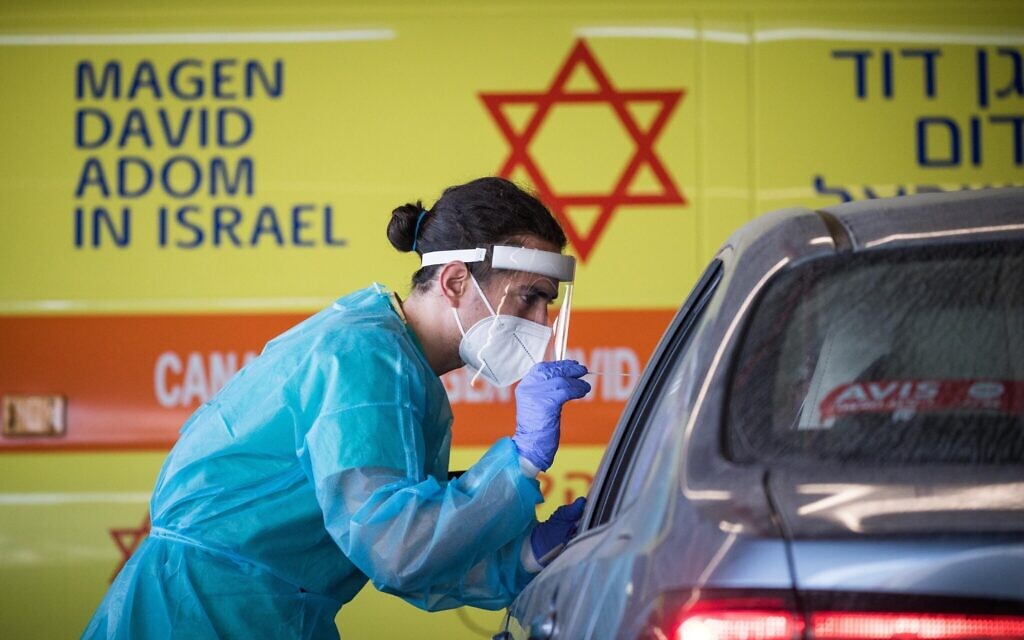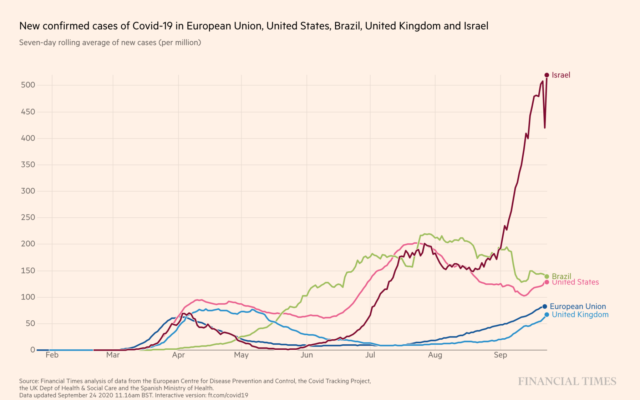COVID doesn’t distinguish between Orthodox and secular, left and right, Jew and Arab. But it does have its limits. Whatever our leaders’ failures, we, the people, can help stop it

And on Yom Kippur it is sealed.
How many shall pass away and how many shall be born,
Who shall live and who shall die,
Who shall reach the end of his days and who shall not,
Who shall perish by water and who by fire,
Who by sword and who by wild beast,
Who by famine and who by thirst,
Who by earthquake and who by plague…
— from the High Holiday prayer Unetaneh Tokef
Yom Kippur 5781 finds Israel deep in the grip of a vicious pandemic, now faring worse than much of the rest of the world.
The number of new cases of COVID-19 has been soaring, to some 7,000-8,000 a day in recent days; the percentage of positive tests is in the 12-15% range; the number of serious cases in Israel’s hospitals is rising inexorably. And so too is the death toll — to 1,450 as of Sunday afternoon.
These statistics — notably the rise in new cases, which place Israel among the most affected countries in the world per capita — are all the more devastating because Israel had appeared to be grappling so effectively with COVID-19 during spring’s “first wave.”

So confident were we, indeed, that we had the pandemic beat, that Benjamin Netanyahu told Israelis at the end of May we could “go out and get life back to normal” and “first of all have fun.” On Saturday night the prime minister, who to his credit quickly recognized the dangers posed by the virus and moved to shut the country down when it first struck, acknowledged that mistakes were made in reopening too early.
For an ostensibly simple virus, COVID-19 is proving murderously confounding. But among the core defenses most experts consider vital to restrict its impact are preventing indoor gatherings, keeping a two-meter social distance, wearing masks, and instituting fast, accurate tracking and tracing procedures to halt chains of contagion.
At the root of Israel’s current plight is the failure to effectively institute those defenses. And that failure has, dismally, been exacerbated by misguided political considerations.
Concerns about “singling out” the ultra-Orthodox community, and to a lesser extent the Arab community, because of their relatively high contagion rates led to the collapse of the “traffic light” system introduced by virus czar Ronni Gamzu, which aimed to lock down and focus on confronting COVID-19 in Israel’s “red zones.” Instead, the contagion was allowed to spread — to disastrous effect in some ultra-Orthodox areas — until the whole nation was placed, first, into a delayed, rather loose “lockdown,” and only now into a more stringent national closure.
A debilitating “we’re not doing it if they’re not doing it” dispute erupted over the need to bar prayers inside synagogues over the High Holiday period and beyond — as some ultra-Orthodox politicians, while acknowledging the imperative, resisted it because outdoor demonstrations against the prime minister were not being similarly banned. The right to prayer is sacred. The right to demonstrate is central to a democracy. A government that enjoyed reasonable public trust would have been able to ensure those rights were upheld even during a pandemic, by instituting a framework to pray, and demonstrate, outside, while scrupulously observing the vital social-distancing requirements. The largest — and thus ostensibly most widely representative — government in Israeli history enjoys no such credibility.
The single establishment in Israel with the staff, the logistical expertise and the discipline to oversee efficient tracking and tracing systems, it should be needless to say, is the IDF. Yet the military was not tasked with this role until the second wave of COVID-19 was heavily upon us — because, former defense minister and would-be prime minister Naftali Bennett charges, Netanyahu did not want to give that responsibility to his rival — and the system is not expected to be fully operational before November.
Israel is formally in lockdown now until October 10, but given the contagion rates, the growing strain on our hospitals, and the delay in setting up efficient tracking and tracing, the health minister and his director general are indicating we may be shut down for considerably longer, with all the terrible consequent social and economic damage.
We are at once helpless before the divine, and simultaneously responsible for our actions and their consequences
On Sunday evening, we begin the Day of Atonement, the Jewish calendar’s mandated 25 hours of introspection — the solemn period when our fate is sealed for the coming year. We are at once helpless before the divine, and simultaneously responsible for our actions and their consequences. And as the Talmud tells us, we are also responsible for each other — for each other’s well-being.
COVID-19 does not differentiate between Orthodox and secular, left and right, Jew and Arab. But as far as we can tell, it does have its limits. It cannot leap vast distances. It can be stopped. Whatever our government is or isn’t doing, we, the people, with common sense and common will, can keep it at bay.
“Who by plague?” Fewer, far fewer, if we can muster a revived spirit of mutual responsibility.
As reported by The Times of Israel
